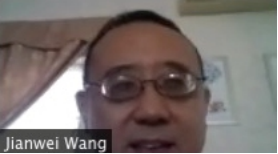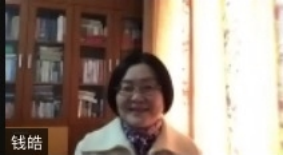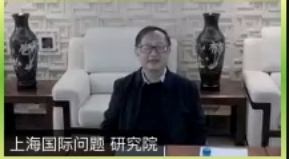Given the increasingly complex China-US-Canada relations in recent years, the Academy of International and Regional Studies and CCS of GDUFS held the first online forum on China-US-Canada relations on April 21, 2021, with the theme of “Challenges and Opportunities in Bilateral and Multilateral Dimensions”, aiming to discuss the problems, challenges and opportunities for cooperation between the three countries in bilateral and multilateral dimensions. The forum invited well-known scholars from China, Canada and the United States, including Robert S. Ross, Professor of Political Science at Boston University and Associate Researcher of Fairbank Center for Chinese Studies at Harvard University; Wang Jianwei, Professor of the University of Macau; Paul Evans, Professor of Institute of Asian Research at the University of British Columbia; and Qian Hao, Professor in the School of International Relations and Public Affairs at Shanghai International Studies University (SISU) and director of the Center for Canadian Studies at SISU. The forum also invited Professor Yang Jiemian, director of the academic committee of Shanghai Institutes for International Studies and honorary president of the Academy of International and Regional Studies of GDUFS, as the commentator. Professor Tang Xiaosong, director of CCS and rotating chairman of the Academy of International and Regional Studies of GDUFS, presided over the forum.

Professor Robert Ross believed that US-China relations would lay the foundation for Canada-China relations. He expressed a very interesting and true view: Americans think Canadians love the United States, but the fact is that Canadians have not loved the United States for four years. Like it or not, it's always difficult to be a superpower’s neighbor. At the same time, he said that Biden's China policy was actually tougher than Trump’s in many aspects, such as in arms sales to Taiwan, defense cooperation with Japan, and technological war against China. Moreover, the United States was increasing its technological cooperation with its allies. The United States was trying to establish an alliance around the world to contain China. It also hoped that Canada and European countries would join its alliance. However, Dr. Ross believed that Europe would not cooperate with the United States in trade policy, nor would Canada.

Professor Wang Jianwei agreed with part of Professor Robert Ross' evaluation of the Biden administration's China policy. The Biden administration's China policy followed an offensive realist path. Biden's China policy was stronger than Trump's. It had taken a confrontational path at almost every level of China-US relations, including the South China Sea and Taiwan. Washington believed that the nature of China-US relations was a zero-sum game. However, Professor Wang also believed that the Biden administration's foreign policy reflected some typical international perspectives of liberalism as well, which was very different from Trump. For example, the Biden Administration agreed to return to multilateralism and international institutions. Professor Wang said there was a mismatch between Biden's China policy and his global policy. For Trump, his global policy was consistent with his China policy. He didn't care about human rights, democracy or climate change, but Biden must cooperate with China. Therefore, the Biden administration's next task was to consider how to reconcile its global policy of liberalism with a tough China policy. When it came to the strategy of alliances, Professor Wang believed that the United States used its allies to deal with China. In this regard, the United States' overreliance on this strategy might not work well. Under the current strategy, Washington seemed to require its allies to choose sides, which was very different from the past.

Professor Paul Evans was pessimistic about the current situation and compared it to a "darker night", which was a situation similar to the cold war. Since a win-win situation was impossible, a "lose-lose" situation should be avoided. He believed that Canada was sandwiched between two superpowers. Paul Evans quoted Premier Zhou Enlai's view in the 1970s that China should deal with Canada, one of the reasons being that Canada is very close to the United States. He said there was no doubt that Canada would keep a close eye on the United States when formulating policies. However, the current consideration seemed to be whether the Biden administration's China policy might be called a policy of "Trump's second term". He suggested that a warmer response was needed to maintain contact and cooperation. Similarly, as Premier Zhou Enlai said, as a middle power, Canada could try to assist in coexistence, cooperation, and mediation. Paul Evans also pointed out that under the current situation, people-to-people exchanges and exchanges between universities would become particularly important, including in the social sciences.

Professor Qian Hao proposed "modus vivendi" approach to deal with China-Canada relations, and cited typical successful cases of China and Canada in history, including China's five principles of peaceful coexistence, the border conflict between China and India, and the relevant concepts put forward by Prime Minister St. Laurent of Canada in March 1954. She believed that history told us that rational Canada and China could implement "modus vivendi" when the two countries disagreed with each other. As for how to do this, Dr. Qian believed that the two sides should maintain open dialogue. When they sat down and negotiated sincerely, compromises were needed. Bilateral negotiations could start with issues such as climate change and sustainable development. Trilateral mechanisms such as Canada-EU-China might be helpful, just as multilateral mechanisms like the CPTPP.

Addressing the four scholars’ wonderful speeches, Professor Yang Jiemian also delivered brilliant comments and views. Professor Yang pointed out that we had seen changes from the Trump to the Biden administrations. New developments had taken place in US-China relations. People hoped that the Biden administration would be more rational and professional. However, through this discussion, everyone seemed more pessimistic than four months ago. Things were not going in the right direction as expected. The United States was not only tougher on China, but also more quickly and firmly uniting its allies, took aim at China and regarded it as a major strategic competitor. Professor Yang stressed that the so-called counterattack from China was the wishful thinking of some people. No matter how difficult for China to make progress, China had made clear that it had no intention of launching a new Cold War or replacing the United States. It was wrong to confuse China's domestic thinking and governance with China's global ambition; that is, it was wrong to think that China wanted to export its ideology and the pattern of its social system. As for the US’ China policy, professor Yang believed that the attitudes of three people in Biden's government team alone were not enough to make a final judgment, nor to decide what kind of policy the United States should adopt towards China. We should focus on its actions. Professor Yang pointed out that the study of China-US-Canada relations could not just look at one single country. We should look at bilateral, trilateral, and multilateral international relations. History told us that China had an interest in the good development of the United States. The sound development of US-China relations was in Canada's interests. Vice versa, if the US-China relations were not good, Canada would also be affected. Today, middle powers are becoming more and more important in stabilizing major power relations, which includes not only China and the United States, but also Europe and Russia. Middle powers are good at mediation, dialogue and maintaining peace, and they adhere to the spirit of compromise. This is what the world really needs today. Finally, with regard to China-Canada relations, professor Yang pointed out that we were in a new era of defining China-Canada relations. The room for improvement in our relationship was closing in all aspects. However, we could not decouple. Interdependence was a long-term trend, and it would be impossible to fight against it.

